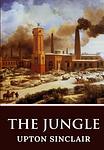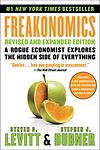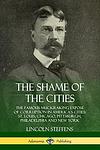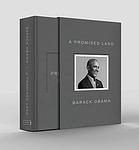The Greatest "Chicago, Political" Books of All Time
Click to learn how this list is calculated.
This list represents a comprehensive and trusted collection of the greatest books. Developed through a specialized algorithm, it brings together 300 'best of' book lists to form a definitive guide to the world's most acclaimed books. For those interested in how these books are chosen, additional details can be found on the rankings page.
Genres
The "Chicago" category of books refers to literature that is set in or inspired by the city of Chicago. These books may explore the city's rich history, diverse culture, and unique architecture, or delve into the lives of its residents and the challenges they face. From gritty crime novels to heartwarming coming-of-age stories, the Chicago genre encompasses a wide range of themes and styles, all united by their connection to this iconic American city.
The "Political" category of books encompasses works that explore the theory, practice, and history of government and politics. These books may cover topics such as political ideologies, political systems, political institutions, political movements, and political leaders. They may also examine the relationship between politics and other areas of society, such as economics, culture, and international relations. Political books can be both informative and thought-provoking, offering readers insights into the complexities of the political world and the challenges of governing in a democratic society.
Countries
Date Range
Reading Statistics
Click the button below to see how many of these books you've read!
Download
If you're interested in downloading this list as a CSV file for use in a spreadsheet application, you can easily do so by clicking the button below. Please note that to ensure a manageable file size and faster download, the CSV will include details for only the first 500 books.
Download-
1. Native Son by Richard Wright
This novel tells the story of Bigger Thomas, a young African-American man living in Chicago's South Side during the 1930s. Bigger's life takes a tragic turn when he accidentally kills a young white woman. The incident leads to his arrest and trial, revealing the deep-seated racial prejudices and injustices prevalent in American society at the time. The narrative explores themes of poverty, systemic racism, fear, and the effects of oppression.
-
2. The Jungle by Upton Sinclair
This novel exposes the harsh conditions and exploited lives of immigrants in the United States in Chicago and similar industrialized cities. The protagonist, a young Lithuanian immigrant, works in the meatpacking industry and experiences the extreme poverty, poor working conditions, and lack of social services. The narrative explores the corruption of the American meatpacking industry in the early 20th century and the hardships faced by the working class, leading to significant public outcry that contributed to the passage of the Pure Food and Drug Act.
-
3. U.S.A. Trilogy by John Dos Passos
The U.S.A. Trilogy is a series of three novels that chronicle the lives of various characters in the first half of the 20th century in the United States. The narrative intertwines the stories of twelve characters as they navigate the societal changes and upheavals of the era, including World War I, the Great Depression, and the rise of Hollywood. The author uses a unique narrative technique that combines traditional prose, newspaper-style headlines, biographies, and stream-of-consciousness writing to paint a vivid picture of American life during this period.
-
4. Twenty Years at Hull-House by Jane Addams
"Twenty Years at Hull-House" is a memoir that recounts the author's experiences co-founding and running a settlement house in a poverty-stricken, immigrant neighborhood in Chicago. The book details the struggles and triumphs of the community as they navigate social, economic, and cultural challenges, while also offering insight into the author's own evolution as a social reformer. Throughout, the author emphasizes the importance of empathy, understanding, and community engagement in addressing social inequality.
-
5. The Resistible Rise of Arturo Ui by Bertolt Brecht
"The Resistible Rise of Arturo Ui" is a satirical play that uses the rise of a fictional 1930s Chicago mobster, Arturo Ui, to parallel the rise of Adolf Hitler in Nazi Germany. The narrative is a critique of those who allowed Hitler to come to power, emphasizing that his rise was indeed resistible. The play explores themes of power, corruption, manipulation, and the dangers of complacency, showcasing the destructive potential of unchecked ambition and the failure of society to prevent the ascent of dangerous individuals.
-
6. Team of Rivals: The Political Genius of Abraham Lincoln by Doris Kearns Goodwin
This book explores the political acumen of Abraham Lincoln, focusing on how he assembled his cabinet from political adversaries, many of whom initially dismissed him for his perceived lack of experience and ungainly appearance. The narrative delves into how Lincoln used his rivals' talents to navigate the tumultuous times of the Civil War, maintaining unity and leading the nation towards the abolition of slavery. It underscores Lincoln's extraordinary ability to turn rivals into allies, demonstrating his leadership and his profound impact on American history.
-
7. The Iron Heel by Jack London
"The Iron Heel" is a dystopian novel set in a future world where a tyrannical oligarchy, known as The Iron Heel, has seized control of the government and economy, brutally suppressing the working class. The story is told through the eyes of a socialist revolutionary, who chronicles the ruthless rise of the oligarchy and the subsequent struggle for freedom and equality. The novel explores themes of class conflict, inequality, and the power of resistance, offering a stark critique of capitalism and a prophetic vision of a future dominated by corporate power.
-
8. There Are No Children Here by Alex Kotlowitz
The book follows the lives of two young African-American brothers growing up in a public housing complex in Chicago during the 1980s. The narrative portrays their daily struggles with poverty, violence, and the drug trade, while also highlighting their dreams and hopes for a better future. The book provides an intimate and heartbreaking look at the harsh realities of inner-city life, systemic racism, and the failure of public institutions to support vulnerable communities.
-
9. Freakonomics by Steven D. Levitt, Stephen J. Dubner
This book explores the hidden side of everything, debunking conventional wisdom and revealing surprising connections between seemingly unrelated things. It uses economic theories to explain social phenomena such as the decrease in crime rates in the 1990s, the impact of a person's name on their life outcomes, and the inner workings of drug gangs. By using data and statistics, it challenges the way people think about the world and encourages them to question the accepted truths in society.
-
10. Working by Studs Terkel
"Working" is a collection of over 100 interviews conducted with people from all walks of life about their jobs. The book provides a unique perspective on the daily grind, as it explores the experiences, thoughts, and feelings of individuals in various professions. The interviews reveal the mundane, the challenging, and the rewarding aspects of work, offering a deep understanding of the complexities of the working world. The subject matter ranges from blue-collar jobs to professional careers, giving voice to the often unheard stories of everyday workers.
-
11. The Red Record by Ida B. Wells
The book in question is a pioneering work of investigative journalism and a searing indictment of lynching in the post-Civil War United States. The author, a prominent African American journalist and activist, meticulously documents the horrific practice of lynching, providing detailed accounts of specific incidents and statistical analysis to debunk the common justifications for such violence. The work exposes the systemic racism and injustice that African Americans faced, and it was instrumental in raising public awareness and galvanizing anti-lynching activism. The author's bravery in confronting this issue head-on, despite threats to her own life, underscores the book's importance as a historical document and a testament to the struggle for civil rights.
-
12. Crisis Of The House Divided by Harry V. Jaffa
"Crisis of the House Divided" is an in-depth analysis of the debates between Abraham Lincoln and Stephen A. Douglas during the 1858 Illinois Senate race. The book examines the philosophical and moral conflicts embodied in the arguments of both figures, particularly focusing on issues of slavery and the nature of the Union. Through a detailed exploration of their speeches, the author argues that Lincoln's stance was not only a political strategy but also a profound moral vision, which laid the groundwork for his presidency and the future of American democracy. The work is celebrated for its rigorous scholarship and its contribution to the understanding of American political thought.
-
13. The Shame Of The Cities by Lincoln Steffens
"The Shame of the Cities" is a collection of articles that exposes the corrupt political machines controlling American cities in the early 20th century. The book details the author's investigations into municipal corruption in several major U.S. cities, including St. Louis, Minneapolis, and Philadelphia. Through vivid descriptions and meticulous reporting, the author reveals how political graft and business interests have compromised the effectiveness and fairness of local governments, highlighting the deep-seated issues of urban politics and the urgent need for reforms to restore civic integrity and public trust.
-
14. The Audacity of Hope by Barack Obama
This book is a call for a new kind of politics that bridges divisions and ideologies. It explores the author's vision for America, discussing a range of issues from the economy and health care to faith and values. The author shares personal reflections on family and his own religious beliefs, while also outlining his thoughts on the American political system, including the influence of money and lobbyists. The book serves as a blueprint for political change, grounded in the author's belief in the potential of the American dream.
-
15. A Promised Land by Barack Obama
"A Promised Land" is a memoir by Barack Obama, the 44th President of the United States. The book covers his early life, his political career, and his presidency. Obama reflects on his successes and failures, his relationships with world leaders, and the challenges he faced during his two terms in office. He also shares personal anecdotes about his family and the toll that public life took on them. Overall, "A Promised Land" is a thoughtful and introspective look at Obama's life and presidency.
-
16. Change We Can Believe In by Barack Obama
This book outlines the political vision of a prominent U.S. politician during his 2008 presidential campaign. It includes his plans on key issues such as the economy, health care, education, and national security. The book also contains a collection of speeches, policy proposals, and personal essays, offering insights into his beliefs, values, and experiences that shaped his political ideology and leadership style.
Reading Statistics
Click the button below to see how many of these books you've read!
Download
If you're interested in downloading this list as a CSV file for use in a spreadsheet application, you can easily do so by clicking the button below. Please note that to ensure a manageable file size and faster download, the CSV will include details for only the first 500 books.
Download














